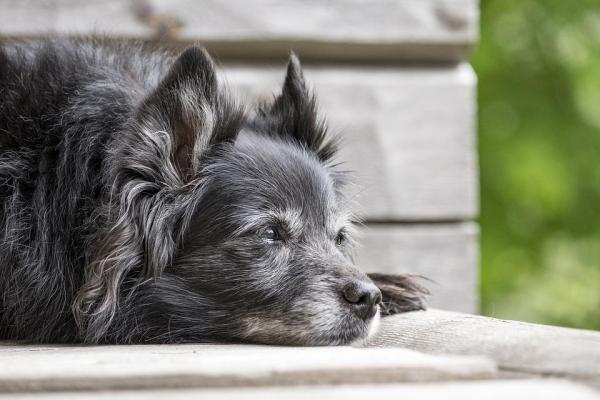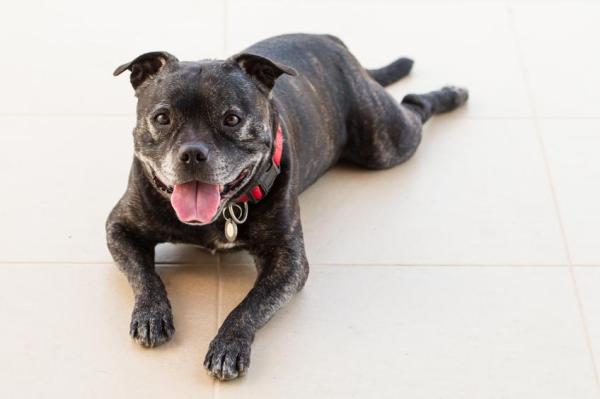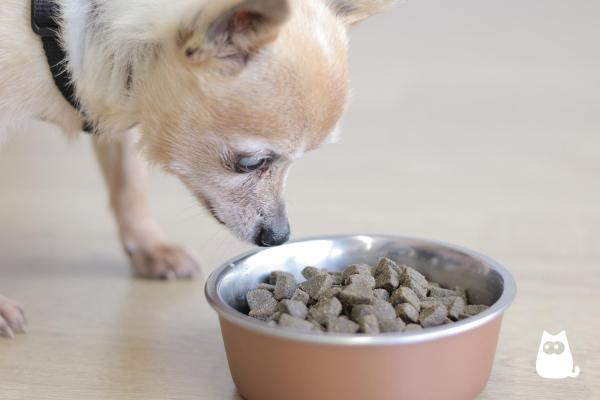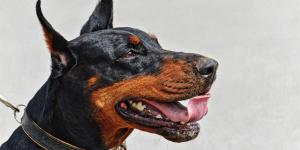Dog Old Age Symptoms



See files for Dogs
Canine aging is a natural process in which a dog’s organism undergoes morphological and physiological changes, which can also intervene in behavior. Like us, when dogs reach a certain age, they can experience certain changes when performing behaviors and actions. These changes favor the appearance of behavioral problems.
Of course, it is important to emphasize that all dogs, regardless of their age, breed or gender, can present behavioral problems throughout their lives. Therefore, it is important that their tutors do not neglect their education and socialization as a means of prevention. This training must be done in addition to providing essential care in preserving the health and quality of life of the animal.
Is your old dog restless? Have you noticed that your old dog is anxious or hyperactive? Behavior problems in older dogs is very common and cannot be ignored. For more about old dog behavior changes, keep reading this AnimalWised where we will be explaining some possible causes of behavior changes in old dogs and how you to prevent them.
Older dog: behavior changes
As a dog ages, their body undergoes numerous physiological and morphological changes, which impact their: metabolism, behavior and appearance. That is to say: aging is not something that happens from one day to another, but is rather a process that is part of a dog’s natural life cycle.
Usually, when we talk about older dogs, we refer to an dog over the age of 8 years old. However, we must consider that it can vary according to the size and/or the breed of the dog. Small dogs, for example, tend to live longer than larger dogs. Therefore, it is important to recognize the signs of old age in a dog.
We must understand that older dogs are more prone to health problems due to their immune system becoming weaker. Older dogs can develop many diseases which can negatively impact their senses and behavior. Becoming more sensitive and vulnerable to pain: a dog may become more aggressive, nervous, fearful or anxious. Therefore, preventive visits to a veterinarian will be essential in verifying a dog’s health status as well as early diagnosis (if necessary).
Is your old dog pacing back and forth? Elderly dogs can suffer from: a loss of sense acuity and experience progressive deterioration of their brain functioning. These can both lead to symptoms of cognitive dysfunction syndrome (which could be compared to Alzheimer's in people). When a dog can no longer manage to perceive the stimuli of its surroundings, it can favor the development of certain behavioral problems, such as: excessive barking and pacing. This can also lead to hypersensitivity, resulting in heightened fear of surrounding objects and noises and restlessness. For this reason, fears and phobias are relatively common at this stage of their lives and can be reflected, in some cases, by obsessive behavior.
In addition, this increase in fear may also cause your old dog anxiety at night. When once your dog could see and understand everything, now it struggles and will therefore feel less capable of protecting itself and you from it’s surroundings.
Is your old dog panting and restless? It is important to bear in mind that an elderly dog can experience a significant reduction in its metabolism, so it will not have as much energy as it used to. It will also sleep more. But this does not mean that they do not need to exercise, expel energy and have fun. If an older dog lives a sedentary routine, it can put emphasis on symptoms of boredom or stress. Boredom and stress can favor the development of inappropriate behaviors and in turn damage the health of the animal.
In addition, we must consider that an old age, our dog’s need a lot of company and affection. An old dog that spends a lot of time alone or doesn’t receive the necessary attention it needs, can suffer from sadness and anxiety. As a result, some behavioral problems may appear, such as: barking or excessive crying, destructiveness and urination. For more, read about urinary incontinence in dogs.

My old dog is acting strange: what to do
If you notice a change in your old dog’s behavioral pattern, such as an increase in aggressiveness, destructive behaviors or the obsessive repetition of certain actions: consult your vet. A professional can verify the health status of your dog and perform the necessary tests needed to determine if any health problem may be causing the behavioral problems.
If an organic cause has been ruled out, we advise consulting a canine educator or ethologist. They will be able to help you correct inappropriate behavior with a set of developed guidelines.
In addition, it is essential that your older dog is surrounded by a positive environment and receives constant proper care both to prevent and treat behavioral problems.
Dog behavior problems: prevention
The way a dog experiences aging depends on many variables, such as: breed, diet, lifestyle, etc. Although we are not able to prevent our dog from aging or intervene in their genetic inheritance, we can offer them adequate preventive medicine throughout their lives. This medicine will allow for a strengthening of immune system, preventing many common diseases and preserving optimal conditions.
We must also understand that older dogs require specific care, as their body has different needs to that of a puppy or an adult dog. Caring for an elderly dog demands: time, dedication, willpower and, above all, a lot of love and affection.
Make sure you offer your older dog: a balanced diet, a comfortable environment and appropriate exercise.
Don’t forget that older dogs also need constant affection. Therefore, it is vital to reserve time to share quality moments with your dog. This is a time when your best friend is at its most vulnerable, so do not ignore or abandon it.

Old age in dogs
For more about old age in dogs and behavior problems in senior dogs, we recommend reading our article on why is my dog turning gray?
If you want to read similar articles to Dog Old Age Symptoms, we recommend you visit our Behavioral problems category.








